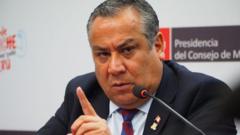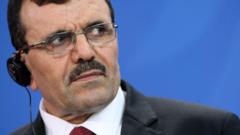The dispute regarding the legacy of Lee Kuan Yew, the founding father of Singapore, primarily centers on a bungalow that has become a symbol of the nation. His youngest son, Lee Hsien Yang, seeks to adhere to his father's wishes while grappling with family tensions and the broader implications of Singapore's political landscape.
Singapore's Iconic Bungalow: A Family Divided Over Legacy

Singapore's Iconic Bungalow: A Family Divided Over Legacy
The legacy of Singapore's founding father, Lee Kuan Yew, has sparked a public feud among his children over the fate of their father's home, reflecting deeper societal issues in the city-state.
Singapore's founding father's legacy has ignited a bitter dispute among his descendants, centering on the fate of a bungalow steeped in historical significance. Lee Kuan Yew, who transformed Singapore into a global powerhouse, did not want this house to become a museum where his private life would be on display—he wished for it to be demolished after his death.
However, the ambiguity of his will has left his children in a contentious standoff, reflecting wider conversations about governance in the semi-authoritarian state. Lee Hsien Yang, the youngest son, has taken a vocal stance on the issue, suggesting that the concentrated power within a single figure fails to ensure true accountability.
According to accounts from family members and over a thousand pages of correspondence reviewed, Lee Kuan Yew's wishes regarding the bungalow have led to conflicts among his children as they battle over its future. Tensions intensified after Lee Hsien Loong, the eldest son and former prime minister, interpreted their father's instructions differently.
Though Lee Hsien Yang and his siblings have differing views on preserving the property, the imprint of Lee Kuan Yew’s leadership looms large. He had long sought to maintain a sense of sovereignty and private life, desiring to keep the residence out of public spectacle.
As the Lee family navigates its complex dynamics, Singapore's broader political narrative unfolds, revealing a landscape where the ideals of accountability and governance stand at a crossroads of legacy, power, and familial strife.




















